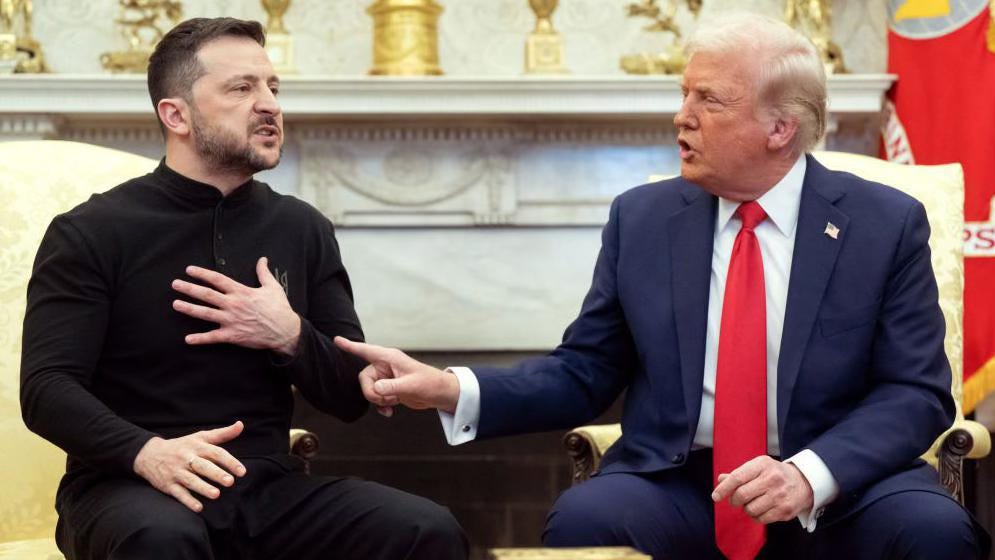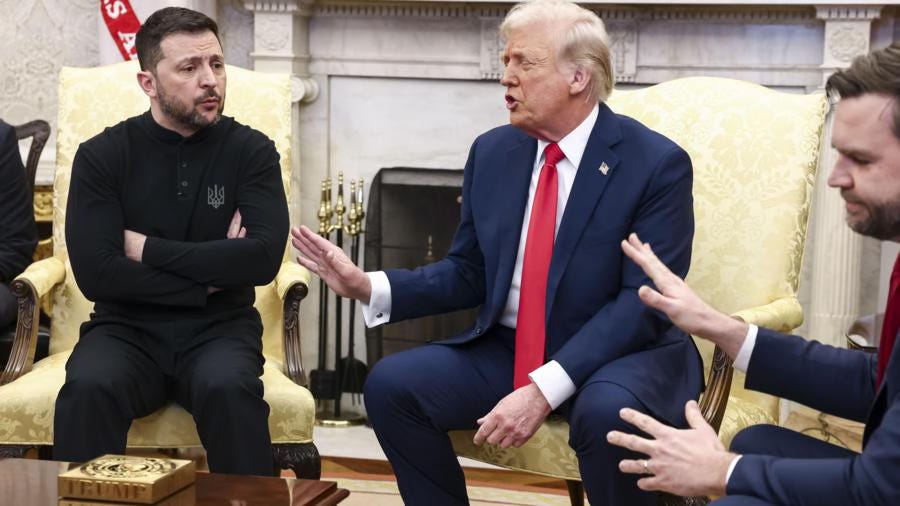Hidden in Plain Sight: Trump's Direct Line to Putin During Ukraine Crisis
"He Had to Suffer": How Trump's Secret Calls with Putin Undermined Zelensky and Revealed a Decades-Old Pattern
The tense Oval Office confrontation between President Trump and Ukrainian President Zelensky revealed more than just diplomatic friction. Enhanced audio from the meeting exposes a disturbing pattern: Trump's ongoing, direct communication with Vladimir Putin during critical negotiations over Ukraine's future.
The Putin Calls Trump Didn't Want You to Notice
In a moment that should have made headlines but somehow didn't, Trump casually admitted to speaking with Putin "a couple of days ago" - just before meeting with Zelensky to discuss Ukraine's fate. When pressed on this revelation, Trump's response was telling: "Are you serious with that question? It went well."
The implications are profound. As Zelensky pleaded for security guarantees and described Russian atrocities, including the abduction of 20,000 Ukrainian children, Trump had already been coordinating with Putin directly. This wasn't just backchannel diplomacy - it was negotiating Ukraine's future with its aggressor before even sitting down with its democratically elected leader.
"Putin Had to Suffer"
Perhaps more troubling than the calls themselves was Trump's peculiar framing. Rather than acknowledging Putin as the aggressor who launched an unprovoked invasion, Trump repeatedly cast Putin as a victim:
"He had to suffer through the Russia hoax, you know, Russia, Russia, Russia, it was a hoax. It was all Biden, it was nothing to do with him. So he had to suffer through that, and he was able to do that."
"Let me tell you, Putin went through a hell of a lot with me."
Trump's repeated expressions of sympathy for Putin's "suffering" stand in stark contrast to his complete lack of empathy for Ukrainian civilians. When Zelensky attempted to show images of tortured Ukrainian POWs and discuss the 20,000 abducted Ukrainian children, Trump quickly redirected the conversation.
Here’s an important excerpt with enhanced audio (background noise digitally eliminated) when Trump discloses his ongoing calls with Putin. The only previously disclosed contact was a 90-minute call on Feb 12.
The Minerals Deal: Who Benefits?
The meeting ostensibly centered around a "minerals deal" giving the U.S. access to Ukraine's raw earth materials. Yet Trump was remarkably vague about how this would benefit Ukraine, while being explicit about America's gain: "We're going to be putting some money in a fund... we're going to get from the raw earth that we're going to be taking and sharing in terms of revenue."
More concerning was Trump's response when asked about these minerals in eastern Ukraine, near Russian-occupied territories: "If I thought [Russian aggression] was going to happen, I wouldn't make a deal." This blind faith in Putin's assurances came immediately after Zelensky had detailed Putin's history of breaking agreements 25 times.
The context of these minerals negotiations takes on new significance in light of Trump's admission of "numerous" undisclosed calls with Putin including "a couple of days ago," which may have followed Emmanuelle Macron’s intervention last week.
The “numerous” calls raise new questions: Was Putin consulted on the US demands before any direct contact between Trump and Zelensky? Was the Russian president attempting to covertly sign on to the US-Ukraine deal in those secret calls? Perhaps this explains Trump’s initial $500 Bn demand from Zelensky? Was Trump adding the cost of the war to Russia and the US, and attempting to get Ukraine to pay for it all?
"I'm Not Aligned With Putin"
When confronted by a Polish reporter about alignment with Putin, Trump's defense was telling: "Well, if I didn't align myself with both of them, you'd never have a deal. You want me to say really terrible things about Putin and then say, 'Hi, Vladimir. How are we doing on the deal?' That doesn't work that way."
This transactional view of diplomacy fails to acknowledge a crucial reality: Putin is the aggressor in an unprovoked war that has killed thousands. Initiating direct and ongoing talks with Putin well before a meeting with America’s ally Zelensky is not an impartial alignment - it’s the exact opposite.
And it’s not just Trump, when JD Vance criticized Zelensky for not being sufficiently grateful, Zelensky asked if Vance had ever visited Ukraine. Vance admitted he'd been there just once, yet insisted he knew better about Ukraine's situation than its own president, claiming: "I've actually watched and seen the stories."
This begs the question: What "stories" were informing the administration's view of Ukraine, and why did their perspective align so closely with Russian propaganda rather than Ukrainian reality?
Keep reading for more details about Trump’s ties to the Kremlin and further analysis of the confrontation.





